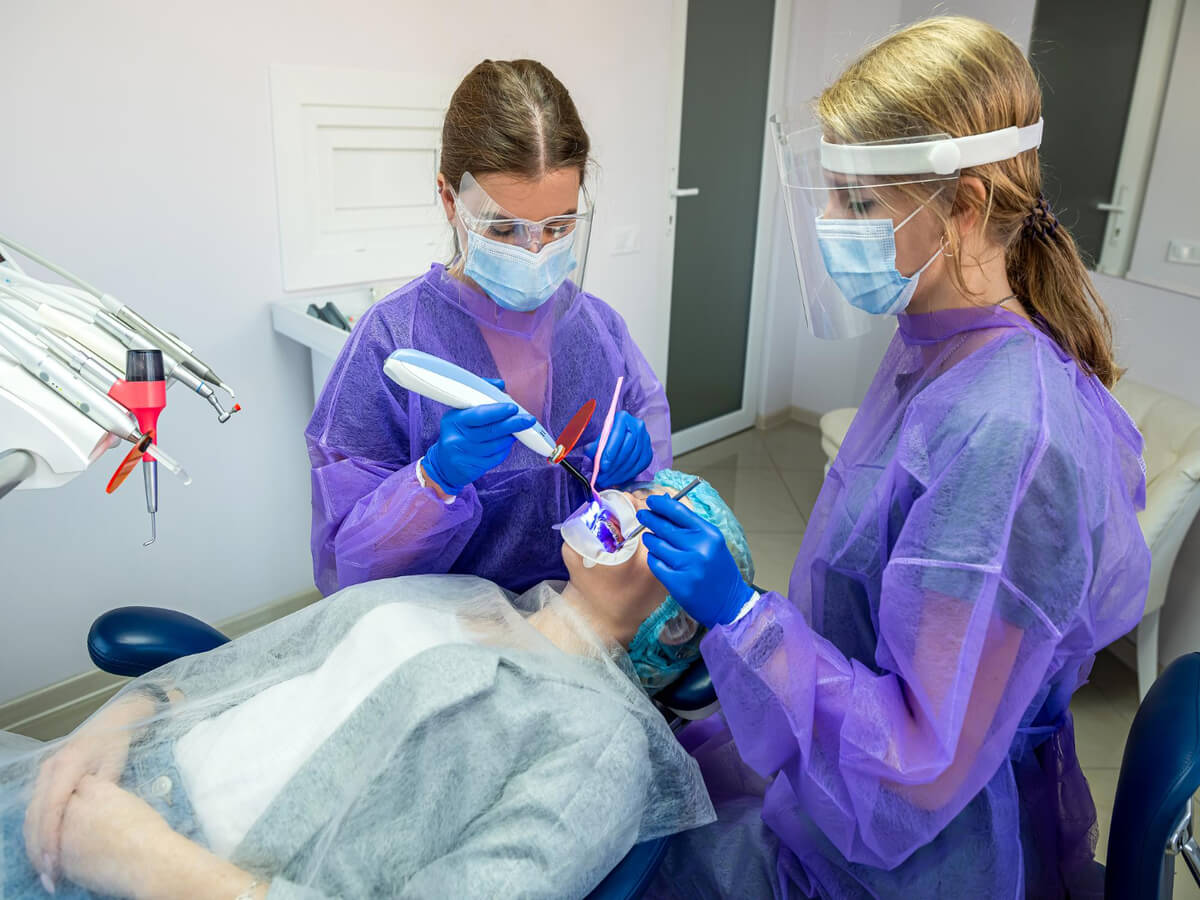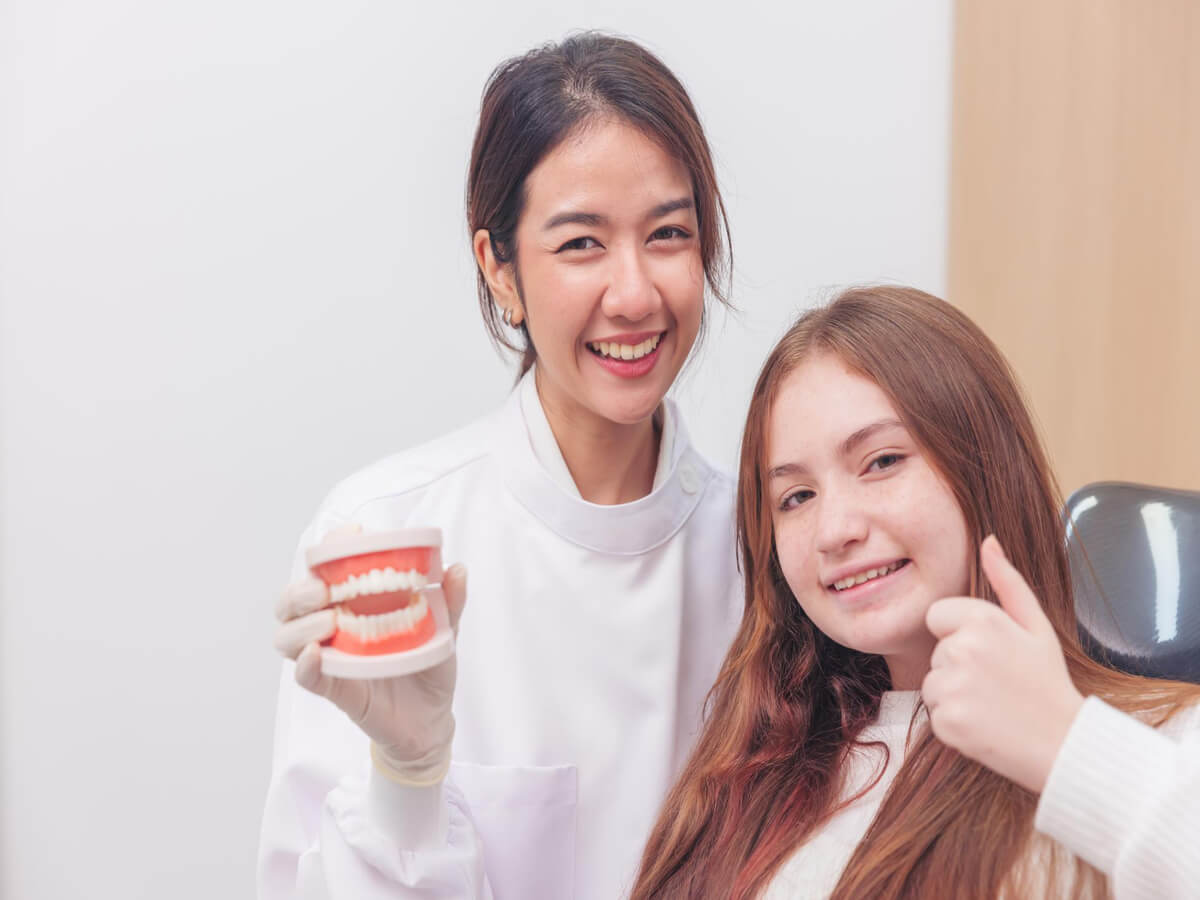Dental Surgery and Extraction for Impacted Wisdom Tooth

Wisdom tooth extraction is a surgical treatment that involves the removal of one or more wisdom teeth, which are the four permanent adult teeth positioned at the top and bottom corners of your mouth.
You'll probably need to have a wisdom tooth pulled if it doesn't have enough room to grow (impacted wisdom tooth), causing discomfort, infection, or other dental issues. A dentist or oral surgeon can remove your wisdom teeth.
Even if impacted teeth aren't creating difficulties now, some dentists and oral surgeons advocate wisdom tooth extraction to avoid future complications.
Painful Impacted Wisdom Tooth

Because they don't have enough room to come in (erupt) or develop normally, wisdom teeth (third molars) become impacted.
Between the ages of 17 and 25, wisdom teeth normally appear. Some people's wisdom teeth erupt without difficulty and line up with the teeth behind the second molars. However, in many situations, the mouth is too crowded for third molars to properly form. These crowded third molars get stuck (impacted).
The partially impacted wisdom teeth may partially emerge, exposing parts of the crown, or it may never break through the gums (fully impacted). The tooth, whether partially or completely impacted, may:
- Grow at a 45-degree angle to the following tooth (second molar).
- Grow toward the back of the mouth at an angle.
- Wisdom teeth grow at a right angle to the other teeth, as though "lying down" within the jawbone.
- Like normal teeth, they grow straight up or down but are confined within the jawbone.
Wisdom teeth that are impacted can cause a variety of issues in the mouth, including:
Harmful to Other Teeth
If the wisdom teeth push on the second molar, the second molar may be damaged or the area may get infected. This pressure might also result in crowding of adjacent teeth, necessitating orthodontic treatment to realign them.
Cysts
In the jawbone, the wisdom tooth develops in a sac. A cyst can form when the sac fills with fluid, causing damage to the jawbone, teeth, and nerves. A tumour, typically noncancerous (benign), arises infrequently. This condition may necessitate tissue and bone removal.
Decay
Wisdom teeth that are partially impacted tend to be more susceptible to tooth decay (caries) than normal teeth. This is most likely due to the difficulty of cleaning wisdom teeth and the easy trapping of food and bacteria between the gum and a partially erupted tooth.
Gum
The difficulty of cleaning impacted, partially erupted wisdom teeth raises the chance of getting pericoronitis, an inflammatory gum condition with severe pain.
Risks Associated With Dental Surgery and Wisdom Tooth Extraction

Having your wisdom teeth removed is a relatively simple and painless process. It is crucial to remember, however, that this is a surgery, and all surgeries have some risk. Most oral surgeons are quite well versed in dealing with any difficulties that may emerge, thus these complications are exceedingly rare if you visit a good dentist.
Nerve Injuries
A nerve around the wisdom tooth delivers messages to your brain from your chin, lower lip, and lower teeth. The nerve and your wisdom teeth are now separated in the majority of people. In some circumstances, though, that gap does not exist. If this is the case, the operation may irritate the nerve, resulting in numbness in your lips or the bottom half of your jaw for a few days or weeks after the procedure. The effect may also be lasting in extremely rare circumstances.
Bleeding
During and after the operation, there will be some bleeding. If there is considerable bleeding during the procedure, your dentist will use suture pressure to stop it. If the bleeding persists after the surgery, bite down on some gauze provided by the dentist. This should solve the issue. Other crucial things to consider include sipping icy cold drinks and applying an ice pack to the cheek on the surgical site. If the bleeding continues, you should see your dentist.
Sinus
The nasal cavity and the gap created by your excised wisdom tooth should be separated by a thin membrane. However, wisdom teeth removal can sometimes tear the membrane, resulting in a gap between your sinus cavity and the empty tooth cavity. If this happens, the dentist will stitch it shut. If you drink water and it comes out of your nose after the operation, you should tell your dentist. To assist prevent the connecting hole from growing, your dentist will advise you not to blow your nose for a few days following the procedure. It is strongly advised that you should not sneeze or cough with your mouth or nose closed. It's best to let it go and wipe your face with a tissue. This will prevent any abrupt pressure changes surrounding the empty tooth socket.
Dry Socket
This happens when a blood clot that has developed in the extraction site falls away inadvertently after surgery. The bone beneath will be visible as a result. This can be uncomfortable; your dentist will offer you guidance on how to keep your mouth healthy to avoid this.
Infection
It's natural for a little illness to develop. This infection will cause a minor swelling that should subside in between 3 to 7 days. Antibiotics provided by your dentist will keep the infection at bay. However, if the swelling persists after the procedure, you should call your dentist right away.
Cysts, infection, impaction, and other unpleasant issues can all be caused by wisdom teeth. Wisdom tooth extraction is a terrific way to avoid these problems, but it's vital to realize that dental surgery is still surgery. There are dangers associated with it. Please visit your dentist if you are concerned about any of the following dangers.
Recovery Time After Dental Surgery and How to Care For Your Mouth

Depending on the type of operation, the typical time for a patient to recuperate completely following oral surgery might range from 7 to 15 days. During this time, the necessary care is focused on preventing complications and reducing the accompanying symptoms.
Bleeding, swelling, soreness, bruising, fever, headache, and even disorientation are some of the most common side effects of oral surgery.
These precautions are simple to make at home, but they must be followed in order for your mouth to recover and remain fully safe.
Tips for a Quicker Recovery Following Oral Surgery
Dental surgery is typically a fairly routine procedure, but it's still important to take the necessary steps to ensure a quick and healthy recovery. Follow these tips and you'll be on your way to feeling better in no time!
- Apply ice.
If it is required to halt the bleeding caused by surgery and promote clotting after the conclusion of the intervention, the first step is usually to bite a gauze saturated with an antifibrinolytic chemical, which improves blood clotting and promotes healing. Keep the gauze in place for at least 30 minutes, applying pressure to the affected area with the mouth closed.
When the bleeding has stopped, the best way to manage inflammation and pain is to apply cool. To avoid swelling of the face, use an ice pack wrapped in a towel or similar on the afflicted area for 15-30 minutes.
- Take medicine as directed.
Another crucial suggestion is to stick to the treatment plan recommended by your dentist or hygienist. These often include antibiotics to prevent infection of the wound, as well as analgesics and anti-inflammatory treatments to speed up cheval recovery.
As a result, the patient can live a more pleasant life in the days after oral surgery, avoiding potential consequences. It is critical to follow the pharmaceutical instructions to the letter, take the prescribed dosage without skipping any doses and take them on time.
- Exceptional dental hygiene.
Although it is best not to touch the wound in the hours after surgery, it is critical to begin regular oral hygiene the next day to avoid infection.
Brushing guidelines, mouthwash and gel usage, and other dental recommendations should be followed. Brushing all teeth softly and with specific care in the afflicted area, avoiding touching the stitches if there are any, should be done on a regular basis using a soft bristle toothbrush or a post-surgical toothbrush.
Consult Our Dentist in Penang for Your Dental Surgery
Wisdom tooth extraction is a major dental treatment that requires experts who have conducted similar procedures on a large number of patients. While no two treatments are identical, they all follow the same processes and aren't started until thorough planning and preparation are complete.
If you have any queries about dental surgery in Penang, don't hesitate to visit Family Dental or directly contact us to book your appointment now!
See you at Family Dental
Opening hours
Mon, Tue & Fri: 9am-6pm
Wed & Thu: 9am-9pm
Sat, Sun & Public Holiday: 10am-6pm